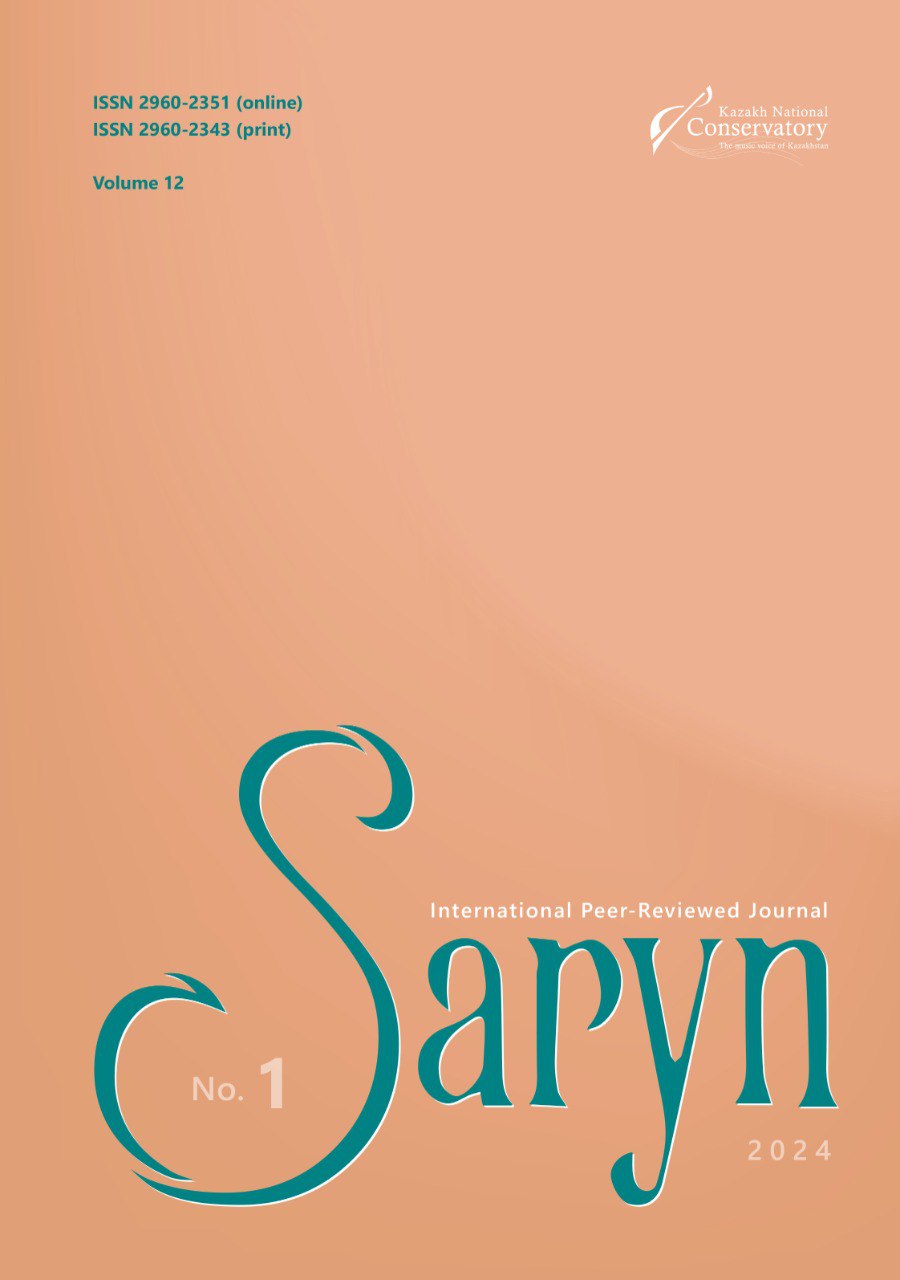Article information
Article publication date
2024-03-22
Article Page
17-30
Chapter
Arts & Humanities
License
Abstract
Electroacoustic music has emerged as a significant realm of exploration for contemporary composers. Among them is the renowned Uzbekistani composer Igor Pinkhasov, who delves into this field alongside academic composition and film soundtracks. This article presents a study of the specific nuances of Pinkhasov’s compositional approach, focusing on his album Time Helix, released in 2015 under the Emu Bands label.
The methodology for analyzing electroacoustic music varies depending on the composer’s chosen sound material. Generally, such analysis is conducted by ear and often involves the creation of a chronometric chart. Given our particular interest in timbral aspects, timbres were of primary consideration in our analysis. Diverse compositions from Pinkhasov's album, including Light of Sirius, The Power of Machines, Echoes of Samarkand, and Memories, were analyzed. In each piece, timbre emerges as a crucial factor in shaping the musical narrative.
Pinkhasov’s timbral dramaturgy draws upon multiple elements, including narrative, multiculturalism, spatiality, and structure. This underscores the multifunctionality of both acoustic and electronic timbres within his compositional framework. Timbral elements not only imbue Pinkhasov’s music with specificity and depth but also evoke genre associations, such as jazz, traditional Uzbek music, and a broader Eastern aesthetic. Similar to orchestral instrumentation, timbres in Pinkhasov’s electronic compositions establish virtual sonic spaces and define the structural and dramatic contours of his works.
Throughout our study, we experimented with a method for analyzing the timbre of electronic music, tailored to Pinkhasov’s compositions. Moving forward, we aim to refine this method, particularly in compiling chronometric tables, to facilitate its broader application in analyzing similar electroacoustic works.
Keywords
electroacoustic music
Igor Pinkhasov
electronic music
sound space
chronometric chart
timbre
timbres multifunctionality
intra-musical content
timbre analysis
compositional principles in music
References
Artemyev, Eduard. Lectures [delivered] at the Moscow State Conservatory in 1992–1994. Transcription by Elena Fatyanova (personal archive of E. Fatyanova).
Asafyev, Boris. Muzykalnaya forma kak process [Musical Form as a Process]. Leningrad, 1971, 344 p. (In Russian)
Bossis, Bruno. “The Analysis of Electroacoustic Music: from Sources to Invariants.” Organized Sound, vol. 11, no. 2, 2006, pp. 101–112. DOI: 10.1017/S135577180600135X.
Eisenstein, Sergey. Budushee zvukovoj filmy. – Zayavka. [The Future of Sound Film. – Application]. Izbrannye proizvedeniya v shesti tomah [Selected Works in Six volumes], vol. 2, Moscow, 1964, 316 p. (In Russian)
Fatyanova, Elena. “Misteriya zvuka Eduarda Artemeva.” [“Sound Mystery of Eduard Artemyev.”] Muzykalnaya akademiya [Music Academy], no. 2 (770), 2020, pp. 99–103. DOI: 10.34690/69. (In Russian)
Fatyanova, Elena. “Simulyakry v elektronnoj muzyke: imitaciya akusticheskih tembrov.” [“Simulacra in Electronic Music: Acoustic Timbres Imitation.”] Problemy muzykalnoj nauki / Music Scholarship, vol. 46, no. 1, 2022, pp. 161–70. (In Russian)
Ganikhanova, Shoyista. “Kompozicionnye principy i kinematograficheskoe myshlenie Kloda Debyussi i Morisa Ravelya.” [“Compositional Principles and Cinematic Thinking of Claude Debussy and Maurice Ravel.”] Obshestvo i innovacii [Society and Innovation], vol. 1, no. 1/s, 2020, pp. 698–05. DOI:10.47689/2181-1415-vol1-iss1/s-pp698-705. (In Russian)
Ganikhanova, Shoyista. “Muzyka v kino Uzbekistana v kontekste problemy sinteza iskusstv.” [“Cinema Music in Uzbekistan in the Context of the Issue of Synthesis of the Arts.”] Problemy muzykalnoj nauki / Music Scholarship, no. 4, 2021, pp. 189–196. DOI: 10.33779/2782-3598.2021.4.189-196. (In Russian)
Kamolidinova, Mokhinur. “Parametry zvukovogo prostranstva, processualnosti I tembra v elektronnoj muzyke.” [“Sound Space Parameters, Processality and Timbre in Electronic Music.”] Problemy sovremennoj nauki i obrazovaniya [Problems of Modern Science and Education], no. 7 (185), 2023, pp. 102–105. (In Russian)
Komarova, Tatyana. “Ehlektroakusticheskaya muzyka: k probleme traktovki termina i opredeleniya zhanra.” [“Electroacoustic Music: on the Problem of Term Interpretation and Definition of Genre.”] Muzyka i elektronika [Music and Electronics], 2018, no. 1, pp. 4–51. (In Russian)
McAdams, Stephen, and Kai Siedenburg. “Perception and Cognition of Musical Timbre.” Foundations in Music Psychology: Theory and Research, edited by Peter Jason Rentfrow and Daniel J. Levitin, Cambridge: The MIT Press, 2019, pp. 71–120, www.mcgill.ca/mpcl/files/mpcl/mcadams_2019_foundmuspsychol.pdf. Access date 18 February 2023.
Medushevskiy, Vyacheslav. “Dvojstvennost muzykalnoj formy i vospriyatie muzyki.” [“Duality of Musical Form and Perception of Music.”] OpenText, www.opentextnn.ru/music/vosprijatie-muzyki/medushevskij-v-a-dvojstvennost-muzykalnoj-formy-i-vosprijatie-muzyki/#. Access date 1 January, 2000.
Nazaykinskiy, Yevgeniy, and Yuriy Rags. “O primenenii akusticheskih metodov issledovaniya v muzykoznanii.” [“On the Use of Acoustic Research Methods in Musicology.”]. Primenenie akusticheskih metodov v muzykoznanii (sbornik statej) [The Use of Acoustic Research Methods in Musicology (Collection of Essays)], edited by Sergey Skrebkov, Moscow, Muzyka, 1964, pp. 3–17. (In Russian)
Tikhomirova, Anna. “Phonic Properties of Harmonic Elements: Steps to the Theory of the Timbre Organization of a Musical Text.” An Art of Sound and Light, proceedings of the 2nd International scientific and practical conference. 18–20 October 2021, St. Petersburg, Russian Institute for the History of Arts, compiled and edited by Olga Kolganova, St. Petersburg, 2021, pp. 117–124. (In Russian)
Tsenova, Valeriya. “Kulturologiya V. Tarnopolskogo.” [“Culturology of V. Tarnopolsky.”] Muzyka iz byvshego SSSR [Music from the former USSR]. Moscow [the publisher is not specified], 1994, pp. 283–296. (In Russian)
Varèse, Edgard. “Osvobozhdenie zvuka.” [“The Liberation of Sound.”]. Kompozitory o sovremennoj kompozicii: hrestomatiya [Composers on Modern Composition: Textbook], transl. from French by Anna Maklygina, edited by Tatyana Kyuregyan and Valeriya Tsenova. Moscow, Moscow Conservatory, 2009, pp. 7–17. (In Russian)




